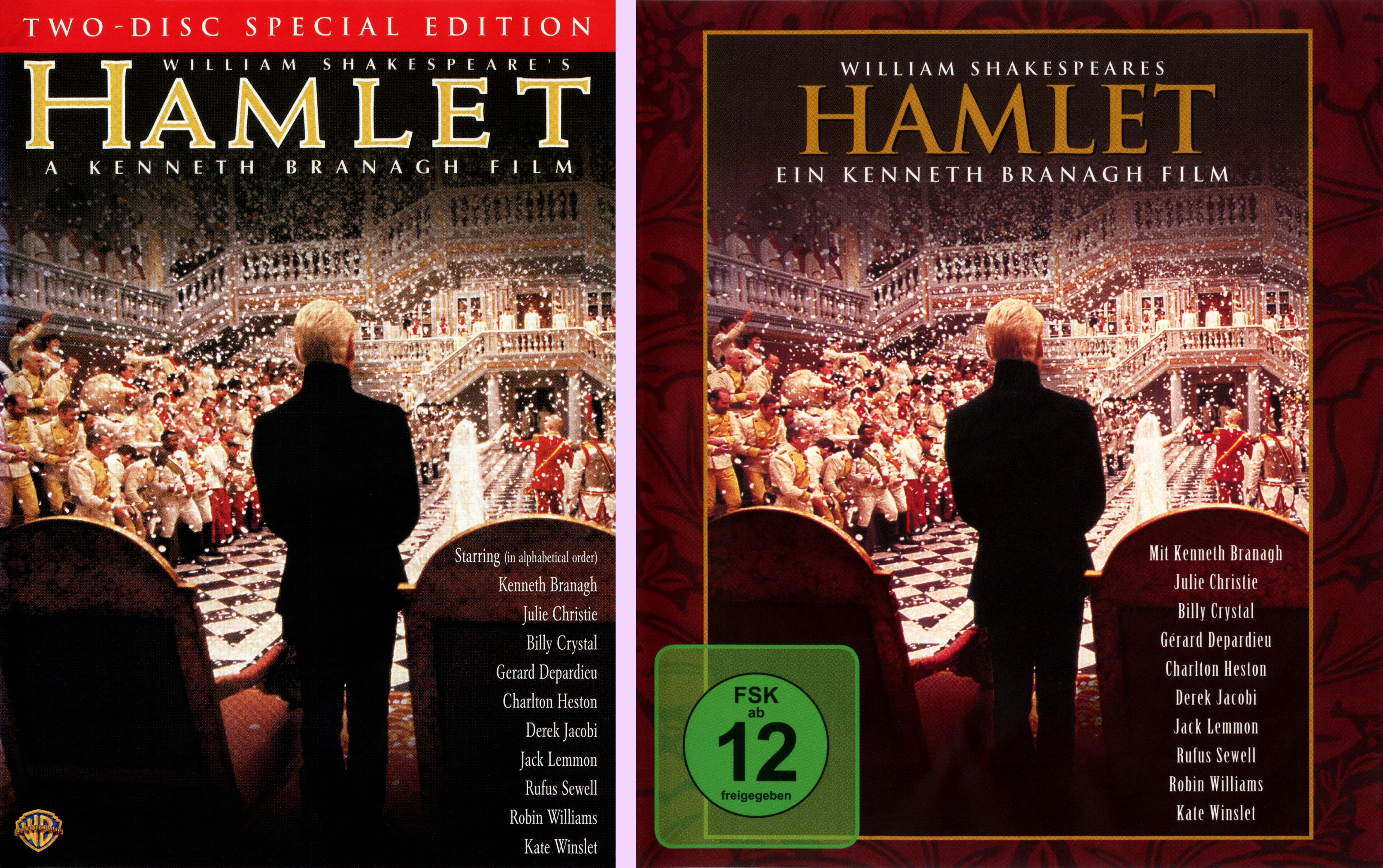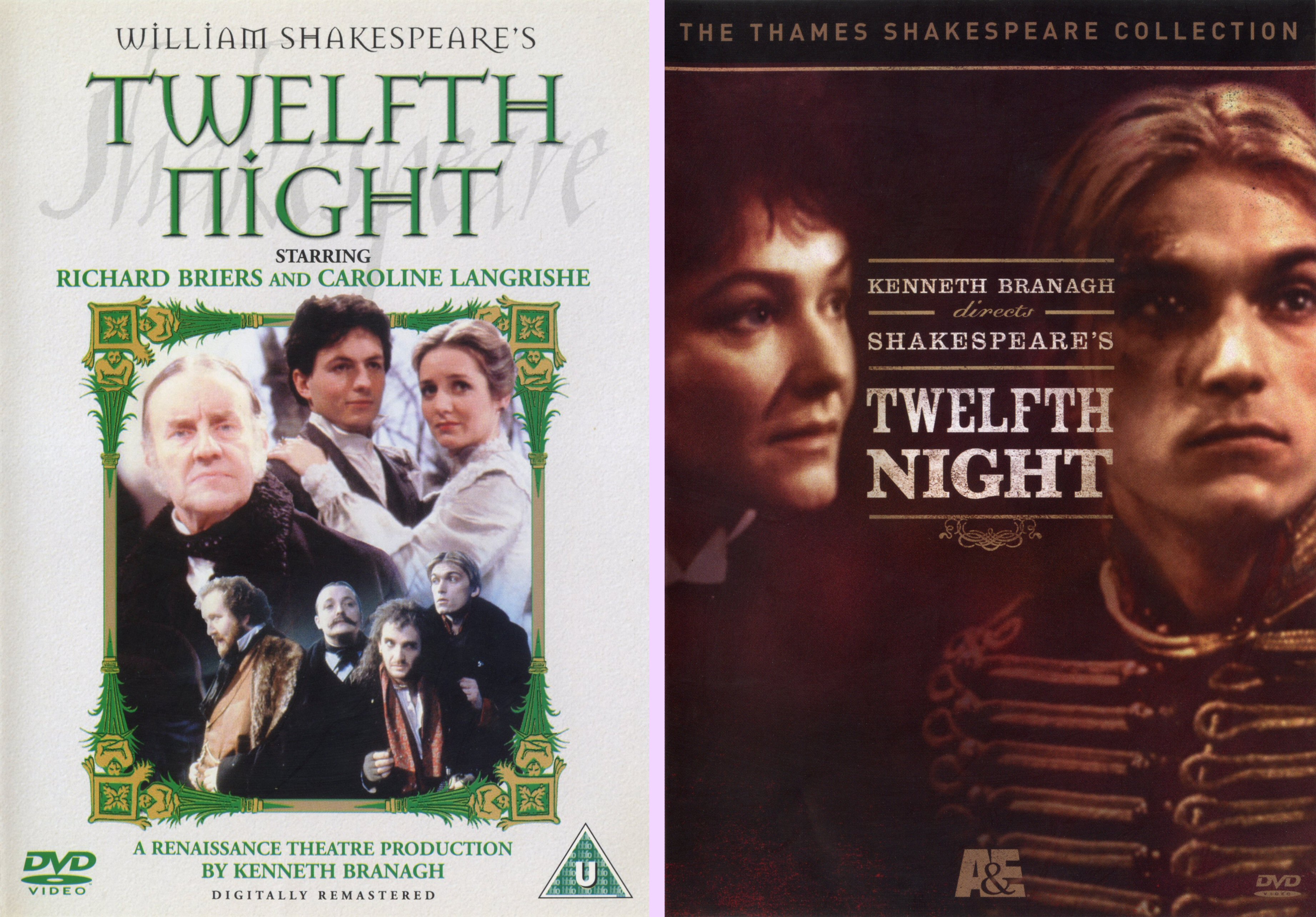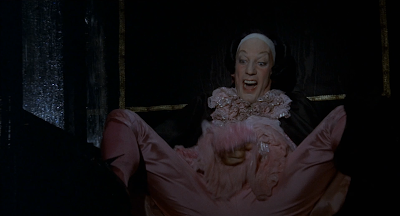Branagh's is hardly the first Hamlet to hit the silver screen - they did it first in 1921 with Asta Nielsen as the titular prince(ss!), and Olivier's Best Picture winner had been the reigning version for decades - but clocking in at over four hours, his was the first to finally adapt the entire play, rather than an abridgement. However, the BBC came pretty close to doing it first with their 1980 television version starring Derek Jacobi (at three and a half hours, it did cut out a little). And it may be a nod to this that Jacobi co-stars here as Hamlet's nemesis uncle king.
But of course, even if the BBC had managed to present the complete play, there's no way they could have managed anything as grand - dare I say ostentatious - than Branagh has. From it's massive sets to not just great RSC actors but Branagh's first case of major stunt casting. Besides Branagh himself in the lead and the aforementioned Jacobi, we see no less than Judi Dench, Kate Winslet, Jack Lemon, Robin Williams, Charlton Heston, John Gielguld, Billy Crystal, Rufus Sewell, Timothy Spall, the great Brian Blessed, Julie Christie, Richard Attenborough, John Mills and even Gérard Depardieu. It's like he picked up an issue of Entertainment Weekly and commanded, bring me all of them! But in the interests of bringing Shakespeare to a wider, mainstream audience, I daresay it was as commendable as it was impressive a feat. Is it a little showy? Oh yes, but it's still the definitive Hamlet to view to this day (sorry, Mel Gibson).
It took Warner Bros a while to release Hamlet on DVD. We had to hold onto our laserdiscs until 2007, when they finally issued it as a pretty impressive 2-disc special edition. It was just a couple years, then, until they issued it on blu in 2010, as a fancy mediabook edition. You might've noticed, though, by the ugly green ratings icon up there, that I have their German edition, which comes in just a traditional amary case. The discs are the same. The only reason I imported is because Hamlet's gone out of print here in the states, and gotten a little pricey. So if you're looking for a way to save a little, Warners has released the same disc, just with different packaging, all around the world.
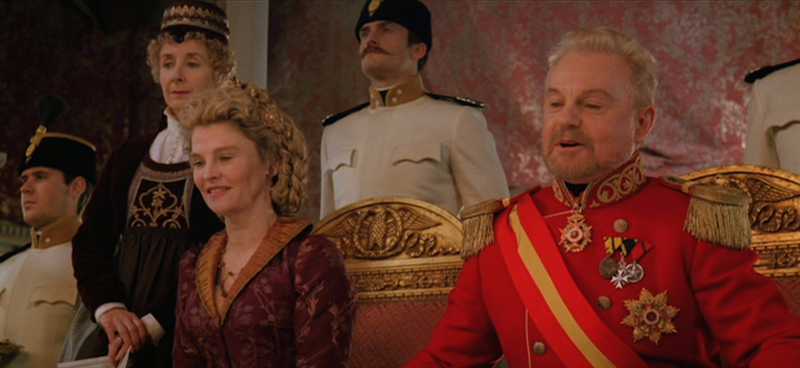 |
| 2007 WB DVD top; 2010 WB BD bottom. |
WB's DVD includes the original, and rather impressive, 5.1 track with optional English, Spanish and French subtitles. The blu-ray bumps that track up to DTS-HD and a whole slew of additional foreign dubs and subs. Nothing to complain about there.
And Warner Bros supplies a very satisfying collection of special features. Both the DVD and BD include a fully engaged audio commentary by Branagh, along with a Shakespeare scholar, who manage to stay informative and enthusiastic for the entire four hours. There's also a brief introduction by Branagh, a nice behind-the-scenes making of featurette that lasts for almost half an hour, a shorter promo featurette and the original trailer. The DVD also includes a bunch of bonus trailers for other Shakespeare adaptations from Warners, and the US blu (though not the German) includes a 38-page booklet with notes and an interview with Branagh.
Now, let's take it back to Branagh's first ever Shakespeare film adaptation, although technically one he didn't direct. It's a British television production of his stage production (which he did direct) of Twelfth Night from 1988. He went right from this in '88 to the impressive Henry V film production in '89, then soon to Much Ado and Hamlet - an amazing trajectory. And so yes, in terms of scale, this is quite small. It's all filmed on one tiny set, though it is shot like a proper film, with close-ups, editing and moving cameras. But it looks like the play, not a fleshed out, realistic movie.
And we don't have the big, movie star cast we've come to expect from Branagh either. But it's no less an impressive work once you sit down and let yourself get absorbed. It may take a little while, admittedly, but that's more to do with Shakespeare's writing than Branagh's direction. This is a comedy with an awful lot of set-up that doesn't really get rollicking until the pins start to fall down. Twelfth Night requires a bit of pay-off, but it's impressive that Shakespeare's comedy still works just as well as any modern work once you're properly invested.
Branagh's said that there are generally two ways to view and present Twelfth Night, ultimately melancholy or comic. Branagh goes for the melancholy, which is not to say the humor is lost. Ultimately, the contrast makes some of the scenes all the funnier. But you can see the difference if you compare this to Trevor Nunn's 1996 film, which adds full cinematic production (they really do up the ship wreck in the opening!), movie stars including Helena Bonham Carter, Richard E Grant and Ben Kingsley and the carefree, light-hearted tone. I absolutely recommend both; they compliment each other and together give you a better appreciation of the source material than either could on their own. Some performances are better in one, some in the other. Even the final song, sung by the fool, are fascinatingly different, despite of course, the same lyrics. Here, Branagh definitely has an edge, both for the more soulful take of his actor and the fact that none other than Paul McCartney created the melody for this version.
Twelfth Night originally only came out in the UK, which is why I have the barebones 2004 Fremantle DVD. But when it A&E put it out a year later in the US, I had to double-dip, because it includes an exclusive interview with Kenneth Branagh. But is the presentation any better on one disc or the other? Honestly, I'm about to learn that right now along with you guys.
 |
| 2004 Fremantle DVD top; 2005 A&E DVD bottom. |
Both just have your basic Dolby stereo audio tracks and neither provide subtitles of any kind.
Again, the one thing that sets the two discs apart is the extra. Fremantle has nothing and A&E has just the one: a twenty+ minute interview with Kenneth Branagh. There's not a lot of info out there about this one, so the interview is very helpful, and he has a lot of keen insight into the play and his own production of it, so it's absolutely worth getting the US disc for rather than the UK.
So now let's roll into one of Branagh's most popular productions, especially today as modern viewers seem to keep rediscovering it, 1993's Much Ado About Nothing. This reunites (then) married couple Branagh and Emma Thompson, who got to conclude Henry V, but now have the entire film focused on their romance. It's the film that proved Denzel Washington was born for Shakespeare and that Keanu Reeves... is popular.
It's another packed cast. Besides everyone I just named, there's Kate Beckinsale, Imelda Staunton, Robert Sean Leonard, Michael Keaton and Brian Blessed yet again stealing every scene he's in. This film works so well because most of the cast is great, and those who aren't are still charming enough to bleed into the flight of fancy romance of this free-spirited endeavor. Is Leonard wooden? So what? They just embrace it and make it part of the pretty artifice! Is Reeves unconvincing? So what? We all knew his villainous plotting was bound for failure from the very beginning. Everyone's running around throwing flowers into the air and singing "hey, nonny nonny!" All our male leads pump their fists in unison as they ride their horses towards camera set to a lavish orchestra. Sure, it can get a little eye-rollingly cringey, but come on, it's a joyous celebration of life and love that's endured over five hundred years. You just have to go in with the right temperament. It's practically Bollywood.
MGM picked this title up from Columbia Tri-Star/ Sony. So Columbia first put out a flipper disc in 1998, then MGM reissued it in 2003 with an additional little making of featurette and ditching the fullscreen version. And in 2011, they released it on blu.
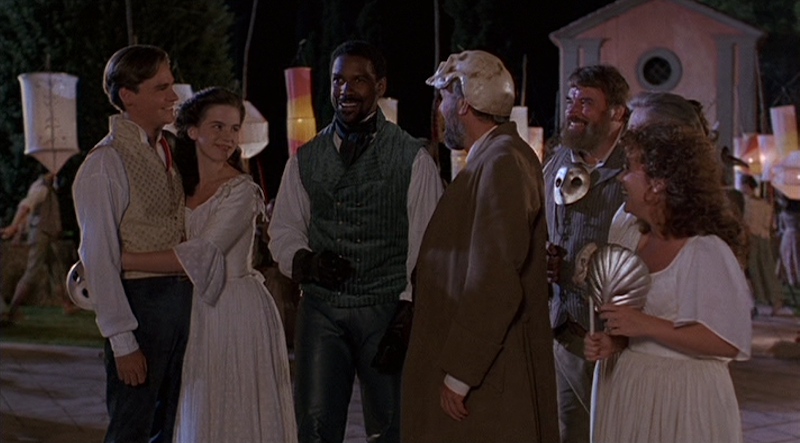 |
| 2003 MGM DVD top; 2011 MGM BD bottom. |
MGM's DVD offered a nice Dolby Stereo Surround track with optional English subtitles, as well as French and Spanish dubs and subs. The blu is the same, but bumps the audio up to DTS-HD and throws in several more dub and sub translations as well.
Now, did I say "little" featurette? Yes, both the DVD and BD have the same extras, which just consist of the one promo featurette and the trailer. And it's nice to get, but it's just six minutes long including multiple clips from the film. So it's more like an expanded trailer with on-set soundbites from the cast. I'd rather have it than not, but if there's one area this film could use an upgrade in, it's the extras.
And finally we come to a film that has sadly yet to be discovered, Branagh's final Shakespeare film to date, 2006's As You Like It, which was released as a TV movie here in the US on HBO. Once again, Branagh rather defiantly opts to tackle one of the lesser known Shakespeare plays (I mean, I'm not saying it's super obscure, but it's not exactly King Lear or Macbeth, with a more mainstream draw). And this time he makes the potentially vaguely offensive choice to set it in Japan. Of course, setting Shakespeare in alternate milieu is a tradition almost as popular as setting it where it was originally intended. But the possible offense coming from keeping it an English story with an almost entirely English cast, and just the trappings of traditional Japanese culture. He does throw one or two bones to Japanese actors in minor supporting roles, but that almost makes it worse, like he's not even doing this out of a genuine commitment to an alternate history take.
But if you can lay that aside, this is another intelligent, beautifully crafted production with another all-star cast. We've got Bryce Dallas Howard (who's actually not bad), David Oyelowo, Kevin Kline, Alfred Molina, Adrian Lester and Brian Blessed in two roles! It's also the only one that Branagh doesn't take a role for himself, except for a brief voice over. It's more separated twins and lovers wooing others in cross-dressed disguise, welcome to Shakespeare comedy, folks. But Branagh is able to pull it off in the 2000s with great costumes, music and production design.
There's just the one 2007 DVD from HBO, although it was reissued by Warner Archives in 2013, so at least it's super easy to obtain.
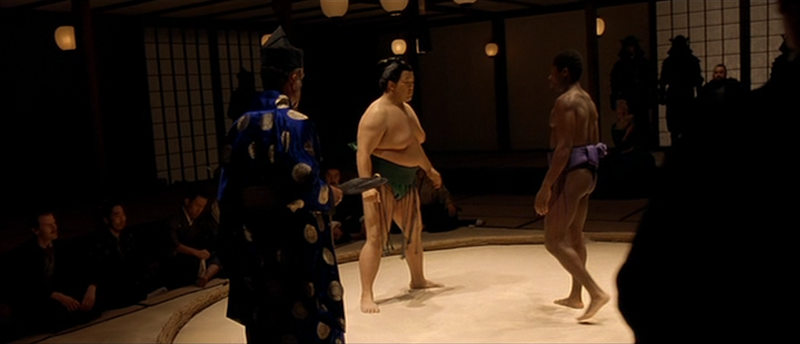 |
| 2007 HBO DVD. |
It's got a clean 5.1 mix and optional English subtitles, as well as a Spanish dub and Spanish and French subtitles.
And it's even got an extra. It's actually even shorter than Much Ado About Nothing's, but it's still better than nothing. It's a making of featurette with your standard mix of B-roll and on set interview soundbites, but it has less film clips, so it's at least worth the very short amount of time it takes to watch it. Obviously, more would've been appreciated.
So there you have it: we've now covered six Kenneth Branagh Shakespeare adaptations to date. And since it's been sixteen years now, possibly all six ever. I guess he struggles to find the financing for these like he used to, so he's moved on to other things, which is a shame, since they're generally his best work. Pretty much all of them could stand an upgrade, to varying degrees of desperation. We'll probably never see a nice boxed set, since they're all owned by different studios. Admittedly, he might have better luck if he tried more of a crowd-pleaser like Richard III; but it's going to take a big change in motion picture audiences before we see him get the chance to make glorious Shakespearian epics like he was able to in the 90s. And I can live with that; there are so many other great films of the bard's work out there already. I'll be happy just to get all the best ones in HD with a couple bonus features. Let's work towards that.

